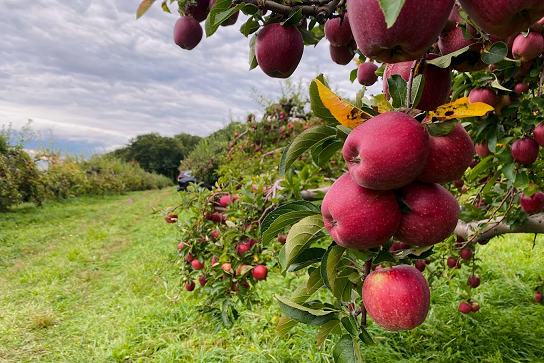By Brian Torpie
Hatched by a Trustee: How the Discussion Began
It all started when Village Trustee Carly Foster brought up an unexpected topic at a recent Warwick Village Board meeting – the idea of changing the law to allow backyard chickens. With egg prices soaring to record highs, Foster noted that many residents might want to raise a few hens to supplement their food supply . Her comments planted a seed of curiosity in our community. As a Warwick resident, I was inspired by Foster’s initiative and began researching what it would really mean to welcome a small flock of hens into our village. What I found is that lifting the chicken ban could be a win-win for Warwick – if we address common concerns with facts and embrace the many benefits of backyard chickens.
Addressing Common Concerns About Backyard Chickens
Change can be scary, and it’s natural for neighbors to have questions. Let’s tackle some of the most common concerns one by one, and see how other communities handle them. With a bit of knowledge and the right rules in place, we can dispel these myths and show that a few hens are nothing to fear.
Concern: “Chickens will be too noisy!”
Reality: Hens are actually pretty quiet. It’s the roosters that crow loudly – and no one is suggesting we allow roosters in the village. In fact, most urban chicken ordinances ban roosters entirely. Hens cluck softly at about 60-70 decibels, which is quieter than a barking dog or even a gas lawnmower . They also sleep at night and won’t disturb anyone after dark. And here’s an interesting fact: hens don’t need a rooster to lay eggs (roosters are only needed to fertilize eggs for breeding) . So Warwick’s rule could simply permit a small number of hens and continue prohibiting roosters – eliminating the main source of noise. Many cities and villages have done exactly that, allowing hens but not roosters. The result? Happy hens and happy neighbors.
Concern: “They will smell and make a mess.”
Reality: A small flock of backyard hens produces far less waste (and odor) than the dogs and cats we already have in our community. Chickens themselves don’t smell bad at all – only their poop has the potential to smell, just like droppings from any outdoor pet . And a few hens produce a surprisingly small amount of manure.
For example, a 4-pound laying hen creates about 0.0035 cubic feet of manure per day, whereas an average dog generates ¾ of a pound of poop per day (which can’t be composted and often ends up polluting waterways) . The reason people fear chickens might stink is usually because they’re thinking of huge factory farms with hundreds or thousands of birds crammed together. Of course those facilities reek – anyone would agree! But a backyard coop with a half-dozen hens, cleaned regularly, is a totally different story. There’s a huge difference between a factory farm and a family coop. In fact, experts note that a well-kept coop with up to 6 hens does not create an odor issue for neighbors . The key is to follow basic cleanliness: just like you scoop a litter box or pick up after a dog, you’d need to clear out the coop bedding and droppings on a routine schedule. Good ventilation and dry, absorbent litter (like straw or wood shavings) also keep smells down. Many towns that allow chickens include rules about regular cleaning and a limit on the number of hens – ensuring things stay clean and sanitary . Bottom line: when cared for properly, a few chickens are no more of a smell nuisance than any other pet.
Concern: “Backyard chickens will attract predators and pests (like rats).”
Reality: This is a worry we hear a lot: folks imagine hawks, foxes, or rodents swarming the neighborhood if chickens arrive. It’s important to remember that any outdoor pet or food source can attract wildlife if not managed responsibly. People who grill outside may attract raccoons; bird feeders can attract squirrels and, yes, sometimes rats. But we don’t ban bird feeders or BBQs – instead, we take sensible steps to mitigate the risks. The same goes for chickens. Other communities have found that proper coop design and management can prevent unwanted critters. For example, ordinances often require using rodent-proof containers for chicken feed and securing coops at night . By storing feed in a metal bin with a tight lid and cleaning up any spilled grain, you won’t be “inviting” mice or rats for a free meal. A Reddit homesteader put it simply: “Chickens don’t attract rodents. Chicken feed attracts rodents. Keep the coop clean and seal up feed, and it’s a non-issue.” Likewise, a sturdy coop and enclosed run (with fencing or hardware cloth) will protect hens from predators like foxes or raccoons. Remember, we already have squirrels, skunks, hawks, and other wildlife around Warwick – they’re part of our environment. Raising hens doesn’t suddenly create predators; it just means we have to be smart about not leaving chicken food or trash uncovered to tempt them. Thousands of urban and suburban towns allow chickens without becoming overrun by pests. In fact, New York City, Los Angeles, Chicago, and many other big cities all permit backyard hens , and they manage with simple rules. Warwick can look to these examples (and resources from groups like Cornell Cooperative Extension) to adopt best practices so that our feathered friends don’t cause unwelcome visitors. With commonsense precautions, backyard chickens need not increase local pest problems – and they might even reduce some (since hens love to eat bugs, including ticks and grubs!).
Concern: “A chicken coop will be an eyesore.”
Reality: If you’re picturing a ramshackle shed or ugly wire pen, think again. Modern backyard coops can be downright charming! City coops are typically small, tidy, and even attractive, because people who keep hens take pride in them . There are many creative coop designs out there – from cute cottage-style coops that match the house to unobtrusive enclosures tucked behind a garage. You can even buy pre-made coop kits that look like little barns or playhouses. The American Poultry Association recommends that urban coops be built to blend into the neighborhood and match existing structures . In other words, a well-kept coop can fit right into the village aesthetic – and often neighbors don’t even notice it’s there unless the owners share some eggs with them! We can also set basic guidelines (as many municipalities do) about coop placement and appearance: for instance, requiring coops to be in the backyard, a certain distance from property lines, and kept in good repair. In short, a coop doesn’t have to be an eyesore at all. It might even become a conversation starter and a tiny rustic accent in our “Queen Village” landscape .
Concern: “Backyard chickens will hurt our property values.”
Reality: There is no evidence that a few pet hens lower anyone’s property values . Think about it – if allowing chickens made neighborhoods undesirable, we’d see it reflected in places that have done so. But plenty of desirable communities (from small towns to major cities like Atlanta, Denver, and even our own New York City) allow backyard chickens, and real estate isn’t suffering there . On the contrary, today’s homebuyers are often attracted to towns that embrace sustainability and urban farming. As long as chicken coops are maintained (and subject to reasonable rules), they’re just another part of the landscape, no more obtrusive than a shed or a swing set. It’s also worth noting that this is a property rights issue – homeowners should have as much freedom as possible to enjoy their property, so long as they aren’t harming others . A well-managed chicken coop with a few hens produces minimal noise and odor (as discussed above), so the impact on neighbors is negligible. Responsible chicken owners are usually very considerate – they routinely talk with their neighbors, address concerns, and often win them over with the gift of free fresh eggs ! In many cases, a chicken coop can actually become a neat little feature that sparks friendly chats and enhances community ties . The bottom line is that a carefully crafted ordinance allowing backyard hens would protect neighbors from nuisances (through limits and standards) while letting residents enjoy a rewarding hobby. There’s no reason to fear that Warwick’s property values would decline; if anything, we’d join the ranks of progressive villages that balance tradition with a touch of modern homesteading.
Concern: “Chickens carry diseases – isn’t it a health hazard?”
Reality: When it comes to diseases like avian flu or salmonella, a small backyard flock poses extremely low risk to public health, especially compared to commercial poultry operations. The U.S. Department of Agriculture and CDC monitor avian influenza closely, and there’s no indication that towns need to ban chickens to protect people . Avian flu is generally spread by wild migratory birds and large-scale farm conditions, not by a handful of well-cared-for hens in a suburban yard. As for salmonella (a bacteria that can be present on eggs or in poultry droppings), the precautions are basically the same as for owning any pet or handling any raw food: wash your hands and practice good hygiene. We already live alongside dogs and cats that carry germs (think of the bacteria in dog waste, which, as mentioned, can be quite hazardous if not handled properly ). We manage those risks with simple habits like hand-washing and cleaning up. Chicken-keeping is no different. If owners maintain a clean coop, collect eggs daily, and follow basic sanitation (for example, washing hands after handling hens, and rinsing eggs before use), the health risk is minimal. In fact, fresh eggs from healthy backyard hens can be safer in some ways – they aren’t sitting in a store for weeks and you know exactly how they’ve been handled. Many communities have successfully allowed chickens with no uptick in health issues; it just requires education on best practices. Warwick could easily provide guidelines (and perhaps partner with Cornell Cooperative Extension for workshops) to ensure new chicken owners know how to keep their flock – and their family – healthy. In short, a few hens pose no more danger to the public than a new dog or cat in the neighborhood. With proper care, backyard chickens will not create any significant health hazard for Warwick residents.
The Many Benefits of Backyard Chickens
Addressing concerns is important, but equally important is recognizing why so many people are interested in backyard chickens in the first place. It’s not just a trendy whim – raising a few hens comes with real benefits for families and the community.
Fresh eggs and happy hens in a Warwick backyard – it’s a vision of sustainability that could soon become reality.
Sustainability and Environment
Backyard chickens are often called “the gateway to sustainability” – they encourage a lifestyle that’s more self-reliant and eco-friendly. For one, hens turn kitchen scraps into food and fertilizer. Instead of tossing out vegetable peels or stale bread, you can give many leftovers to the chickens, keeping tons of organic waste out of landfills. (A small flock of four hens can consume over 100 pounds of food waste a year, by one estimate !) This greatly reduces household food waste, which is a big deal considering that households produce twice as much food waste as restaurants and five times as much as retail outlets . In other words, letting chickens “recycle” our scraps can help Warwick shrink its trash footprint and waste less. Moreover, chicken droppings, far from being just a smelly byproduct, are garden gold. Chicken manure is rich in nitrogen and, when composted properly, turns into an excellent fertilizer that can enrich our gardens and community green spaces . Many Warwick residents love to garden; having a few hens provides a ready supply of compost to grow healthier lawns, flowers, and veggies without chemical fertilizers. Chickens also eat insects and weeds – they’re like a natural pest control service for your yard . This means fewer chemicals (pesticides, herbicides) going into our soil and water, aligning perfectly with Warwick’s environmental values. Finally, let’s talk about the carbon footprint: local eggs versus store-bought. It’s been found that about 19% of food-related greenhouse emissions come from transport (moving goods in trucks, refrigeration, etc.) . By collecting eggs from your backyard, you eliminate those transportation emissions entirely – you can’t get more local than 0 food-miles! And farm-fresh eggs don’t require wasteful packaging or constant refrigeration like supermarket eggs do . All told, backyard hens are a step toward a more sustainable Warwick. We pride ourselves on our green spaces and farmers’ market; allowing chickens would be another way to support local, sustainable food production on a micro scale.
Educational Value
For families with children (and even for us adults), raising chickens is an incredible hands-on learning experience. I can personally attest – in researching this issue I’ve learned more about animal care and ecology than I ever expected. Kids, in particular, benefit from knowing where their food comes from. Gathering eggs from the coop each day teaches responsibility and provides a tangible connection to science and nature. As one backyard chicken owner noted, children learn about responsibility, animal care, and the origins of their food, fostering a deeper connection to our food system . Instead of seeing eggs as just cartoons in a grocery store aisle, they’ll understand the life cycle and effort behind each one. This kind of “agricultural literacy” is something many educators advocate for, and you can’t get a better lesson than right in your own yard. Caring for chickens also instills values of sustainability and empathy – kids (and adults) develop a routine of tending to the needs of their hens, ensuring they have fresh water, proper shelter, and a clean habitat. Such experiences can be profoundly satisfying and grounding in today’s digital, high-speed world. Even those without kids find that chickens make engaging pets; they each have personalities and routines that can be quite entertaining (there’s a reason chicken videos go viral online!). Some Warwick residents have expressed that they want their children to grow up with these experiences – teaching them about respecting animals and being responsible caretakers. By lifting the ban, we allow interested families to have this enriching, educational opportunity. Imagine scout troops or school classes visiting a classmate’s coop for a “show and tell” on sustainability. It’s a chance to strengthen community bonds through shared learning, right at home.
Community and Social Impact
Beyond individual families, backyard chickens can actually bring neighbors together and enhance our community spirit. It might sound surprising – how could a few hens do all that? But consider this: When you have an overflow of fresh eggs, you tend to share them. “There are eggs to share,”
as one report on urban chicken keeping put it, and a coop can become a conversation starter in the neighborhood. Instead of neighbors only chit-chatting about the weather, they might bond over the fence asking, “How are the girls (hens) doing? Any extra eggs today?” This kind of friendly interaction is something we could all use a bit more of. In fact, an initiative in France showed just how powerful chickens can be for community-building. A small village in northwest France (Pincé) gave two chickens to any household that wanted them, as a way to reduce food waste. The mayor initially suggested it as a joke, but then realized it was a great idea – not only would the chickens eat up kitchen scraps, but “it will also reinforce community links: just as people look after their neighbors’ cats and dogs while they’re away, they’ll also look after the chickens,” the mayor said . I love that example, because it highlights how keeping animals – even something as humble as chickens – can reconnect us with our neighbors. We start looking out for each other more. Already, Warwick is a tight-knit village where we take care of our own; adding backyard chickens could deepen that camaraderie. We might end up with neighborhood coops becoming mini-hubs of community activity, or local “egg swaps” alongside our farmer’s market culture. And in times of uncertainty (like we saw during recent supply chain disruptions), knowing your neighbor has a few extra eggs or some garden produce can create a sense of security and mutual support. There’s also an element of resilience and self-sufficiency that benefits the community. When many households produce a bit of their own food (be it eggs, veggies, etc.), the community as a whole becomes less reliant on distant supply chains and more focused on local wellness. It’s no wonder that during World War II, Americans were encouraged to raise chickens and plant “victory gardens” as a patriotic duty – it strengthened the home front. Today, backyard chickens aren’t about war efforts, but they are about empowering communities. By lifting the chicken ban, Warwick would join a growing movement of towns that embrace local food and community sustainability. As one article noted, this trend is gaining traction in urban and suburban areas as a response to rising food prices and a desire for more control over our food supply . In short, allowing backyard hens isn’t just about eggs – it’s about embracing Warwick’s agricultural heritage, fostering neighborly connections, and taking a step toward a more sustainable future together.
Let’s Bring Hens Home to Roost: Call to Action for Warwick Residents
Warwick has a proud history of balancing rural charm with village life. We value community, sustainability, and responsible governance. Now we have a chance to put those values into action by updating an outdated 1976 law that no longer makes sense. It’s time to lift the backyard chicken ban and allow residents – with reasonable guidelines – to enjoy all the benefits discussed above. The Village Board is actively considering this change, but they need to hear from us, the residents, to gauge support and address any lingering concerns. If you agree that Warwick should welcome a limited number of well-cared-for hens into our backyards, now is the moment to speak up!
Here’s how you can help: Contact the Village of Warwick officials and let them know you support lifting the chicken ban. Even a brief email or call can make a difference. Below is the contact information for our Village Clerk, Mayor, and Trustees. Kindly express your support and any thoughts on how a new ordinance could be
crafted to keep everyone happy (both chicken-owners and neighbors alike). Our leaders are listening, and your voice matters:
- Raina Abramson – Village Clerk (845-986-2031 ext. 3, clerk@villageofwarwick.org)
- Michael Newhard – Mayor (845-986-2031 ext. 2, mayor@villageofwarwick.org)
- Barry Cheney – Trustee (Deputy Mayor) – cheney@villageofwarwick.org
- Mary Collura – Trustee – collura@villageofwarwick.org
- Carly Foster – Trustee – foster@villageofwarwick.org
- Thomas McKnight – Trustee – tmcknight@villageofwarwick.org
When reaching out, you might mention why this issue is important to you – whether it’s the promise of home-grown eggs, teaching your kids about nature, or helping Warwick be more sustainable. Feel free to cite some of the research and examples (the Village Board has already heard some at recent meetings, and it helps reinforce that these points are backed by evidence). Remember to always keep a respectful tone; our goal is to inform and persuade through good citizenship.
In closing, allowing backyard chickens in Warwick is a small change that could bring big rewards. It’s an opportunity to strengthen our community’s resilience, educate our young ones, and even have a little fun along the way (who doesn’t smile at the sight of a happy hen pecking in the yard?). By addressing the concerns with sensible rules – and there are plenty of models from other towns to draw on – we can ensure that everyone wins: families who want hens get to have them, and neighbors are protected from nuisances. Let’s move Warwick forward on this issue and show that our village can adapt and grow while keeping its special character. As Carly Foster’s initiative has shown, the conversation is already underway. Now it’s up to us to keep it going and encourage our elected officials to make this common-sense change. Join me in speaking up for a Warwick that welcomes backyard chickens – a Warwick that truly embraces its motto as the “Queen Village” by leading the way in sustainable, community-friendly living.
Together, we can bring a new meaning to “home-grown” in Warwick – with fresh eggs, flourishing gardens, and neighbors brought closer by our own local “micro-farms.” Let’s lift the ban and let Warwick’s community spirit (and perhaps a cheerful cluck or two) shine!









